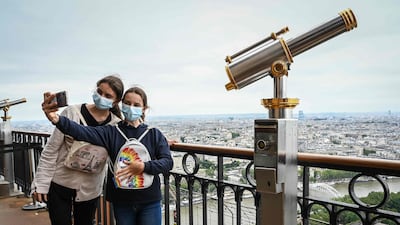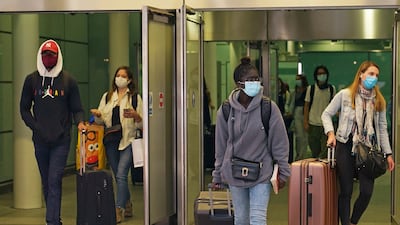France’s health pass system has entered daily life, controlling entry to cultural and leisure centres and marking a new era in how visitors to major attractions can be reassured that pandemic risks have been minimised.
Museums, cinemas, theatres, tourist sites and other establishments attracting more than 50 visitors at any one time must demand proof of double vaccination or a recent negative Covid test as a condition of entry.
The rules are not without controversy. More than 110,000 demonstrators took to the streets across France last weekend to object to the supposedly “dictatorial” threat to their freedom posed by the requirement.

Having paused from admiring artworks at the Matisse museum in Nice, Dr Karim Belaid offered a poignant response those unconvinced by the need for inoculation against Covid-19.
“A patient of mine died from the virus,” he said. “She was infected by a nurse who had not been vaccinated.”
To Dr Belaid, 62, on holiday from his home and practice 100 kilometres east of Paris, the thought that his patient might still be alive had the nurse received the shots provides a powerful argument for inoculation.
“Everyone has to realise this is our only solution in the crisis,” he said. “Some young people are still reluctant. The health pass system helps but those who are perhaps unlikely to go to museums need to talk to others, see the vaccination centres in action.
”As for care workers and those in the health service, it is perfectly reasonable to require vaccination as a condition of employment in the sector.”
Most in France accept the view expressed by Dr Belaid. But a furious minority reaction has already persuaded President Emmanuel Macron’s government to put off or ease other planned measures, including sanctions for non-compliance.
Protesters ranged from health service professionals, facing suspicion or dismissal if they fail to accept vaccination by September, to far-left and far-right groups and relics of the anti-government gilets jaunes – yellow vests – movement that began in late 2018 and continued for more than two years before fizzling out by the start of the first French lockdown in March last year.
Some demonstrators likened the health pass to the yellow star Jews were forced to wear during the Nazi occupation of France in the Second World War, a comparison roundly condemned by political leaders and historians.
At the museum dedicated to the work of painter and sculptor Henri Matisse in the elegant Nice suburb of Cimiez, high above the Promenade des Anglais, staff dealt with a steady stream of visitors as the scheme went hesitantly into action.
“The machine to scan vaccination records isn’t working yet so everyone has to show the bar codes on their mobiles or proof of negative tests,” said a museum member of staff after completing an arts and crafts sessions with a small group of local children, exempt from the restrictions.
But on a hot midweek morning, there were not enough visitors to overwhelm counter assistants and the inspections were carried out smoothly with little obvious delay.
In one successful early test of the system’s fairness, clients with evidence of vaccination in other countries, including the UK, Switzerland and the Netherlands, encountered no difficulties when showing records stored on mobile phone apps.
This was important as foreign voices sometimes seemed to outnumber French ones inside the museum.

Three teenage girls from Zurich needed help from a nearby English speaker before they could understand instructions from members of staff but said they were reasonably impressed with the effectiveness of the controls.
All three, on holiday in Nice, were visiting the museum on the recommendation of a Swiss friend. Matisse, who lived from 1869 to 1954, was deeply attached to Nice, far from his roots in northern France. He lived nearby in the majestic Hotel Regina, now a block of luxury flats but once favoured as a winter retreat by the Britain‘s Queen Victoria and other European monarchs, and is buried in the local cemetery.
“We knew about the requirements from checking the museum online,” said Celine Lorenz, 18. “It was all fine and the museum is really nice. But it seems a little weird that we have to go through all that here, whereas we only had to provide proof of age at a nightclub.”
Her friends, Lena Haeberli, 17, and Leonie Gohl, 18, agreed but said they hoped the new system would motivate those reluctant to receive shots.
“It‘s a shame some people will be left out but it’s their choice if they refuse to be vaccinated,” said Leonie.
Celine added: “The pandemic is still there.”
Janne Hekhuis, part of a family group of three adults and five children from Amsterdam, spoke of the about-turn by Dutch authorities, saying they had re-imposed restrictions after realising they had been eased too soon. “It’s the big events like discos where much more caution is needed, rather than places like museums where social distancing is easier to maintain,“ she said.
The French government has acknowledged the arrival of a fourth wave of the epidemic, with the number of infections up by 229 per cent in a week and 21,000 new cases logged between Tuesday and Wednesday. The spread is especially rapid in areas attracting large numbers of holidaymakers.
The health pass scheme will be extended to other venues from the start of August but fines – already cut from a proposed €45,000 (US$53,000) for businesses failing to enforce controls to a starting penalty of €1,500 – will not be introduced until a date to be announced.
“We must explain to citizens that with our health security at stake, we are firm in our principles but also pragmatic,” said the prime minister, Jean Castex.

























